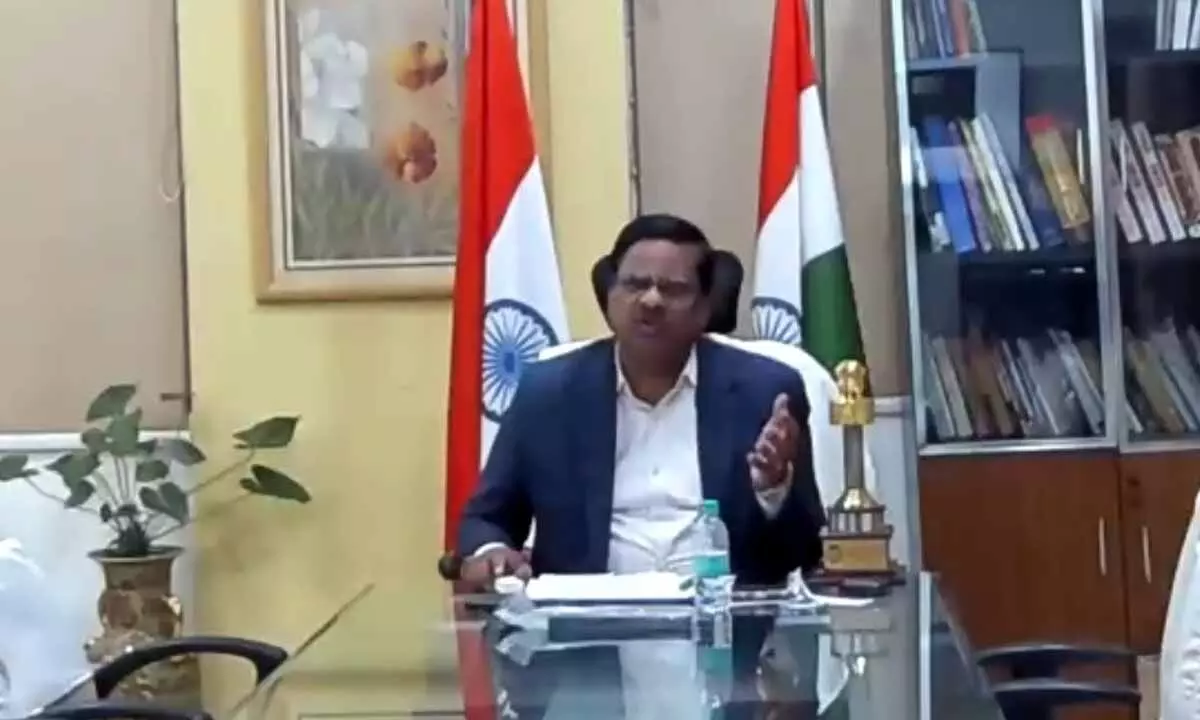The internationalisation of higher education is irreversible- TGCHE Chairman Prof Balakista Reddy

Hyderabad: Telangana Council of Higher Education (TGCHE) Chairman Prof. V. Balakista Reddy highlighted global developments shaping modern higher education.
On Thursday, he addressed the inaugural session of an online workshop on Institutional Development Plans (IDP), attended by 1,500 representatives from about 1,000 institutions, including Vice Chancellors, Deans, Senior Professors, and industry representatives.
Prof Balakista Reddy noted that the internationalization of higher education is irreversible and traced its evolution over the last three decades. He also discussed the impact of global treaties like WTO/GATT on the current higher education ecosystem. Emphasizing that global interdependence is a new reality. He urged the audience to concentrate on institutional development plans, as the global community is looking to India as a knowledge hub that can contribute to global security and peace.
The Chief Guest, Prof. Nirmaljeet Singh Kalsi, IAS (Retd.), Chairman of the Committee for Preparing IDP Guidelines and former Chairman of NCVET, New Delhi, spoke about the role of IDP as a blueprint for the growth and progress of higher education institutions over a defined period. He stressed the importance of resource and capacity management and the need for quality assurance and monitoring within institutions. He emphasized the necessity for strategic alignment with the institutions' goals, vision, and mission and the involvement of all stakeholders.
Prof. V. Ramgopal Rao, Vice-Chancellor of BITS Pilani campuses (Pilani, Hyderabad, Goa, Dubai, and Mumbai), discussed the role of faculty in building institutions of excellence. He highlighted the need for faculty to collaborate with the industry to gain practical experience and to design doctoral programs that foster startup incubation.
Prof. S.S. Mantha, former Chairman of AICTE, New Delhi, underscored the importance of addressing skill gaps and developmental needs in higher education and suggested that universities should become AI-enabled in the future.
Dr. Sandhya Chintala, Executive Director of the IT-ITeS Sector Skills Council and Vice President of NASSCOM spoke about achieving outcome-based education through hybrid collaborations between universities and industries, focusing on innovation, research and development, and entrepreneurship. She proposed organizing online faculty development programs through NASSCOM's future skills initiatives.
Speakers discussed various strategies and best practices for developing IDPs. They included Abhishek Singh, Chief Manager of Strategic Initiatives at BITS Pilani; Dr K.N. Subramanya, Principal of RV College of Engineering in Bengaluru; Dr N. Ravichandran, former Director of IIM Indore; Prof. S. Venkataramanaiah from IIM Lucknow; Dr. Prashanth Vishwanath, Dean at JSS Academy of Higher Education & Research, Mysuru; and Dr. Sabeen Govind, Associate Professor at Rajagiri College of Social Sciences.
The third session of the event focused on the role of IDP enablers in formulating a strategic roadmap to achieve institutional goals. Speakers included Prof. N.V. Ramana Rao, Director of NIT Raipur; Prof. G. Simon Thattil, Dean of the Faculty of Commerce at the University of Kerala; Dr. Mangala Sunder K, Emeritus Professor in the Department of Chemistry at IIT Madras; Prof. Bhaskar Bhattacharya from the Department of Physics at Banaras Hindu University; Dr. Y.M. Jayaraj, Vice-Chancellor of Pravara Institute of Medical Sciences; and Prof. Ajay M. Sidpara, Associate Professor at IIT Kharagpur. They shared their experiences on IDP enablers for NIRF Rankings and NAAC Accreditation.
Experts in the fourth session of the event focused on the impact of IDP on institutional rankings and accreditation, drawing from specific case studies. The speakers were Dr B. Rushi Kumar, Assistant Director of RAAC and Professor at VIT Vellore; Prof. B. Raja Shekhar, Former Pro Vice-Chancellor of the University of Hyderabad; K. Venkatesh, Director of the Institute for Academic Excellence; and Dr Nandhibatla Viswanadha Sastry, Director of Ranking and Accreditation at IAE.
Overall, the workshop addressed various issues, providing directions for academic, administrative, and infrastructural advancements to ensure institutions remain competitive and effective in meeting their educational objectives. It emphasized the role of key stakeholders—board members, faculty, students, and staff—in shaping strategies that support academic excellence, financial stability, research, and skill development. Additionally, it focused on improving governance, curriculum design, faculty training, and student support systems. Quality assurance mechanisms to monitor progress and partnerships with industries were also highlighted to help create opportunities for practical learning and career development.


